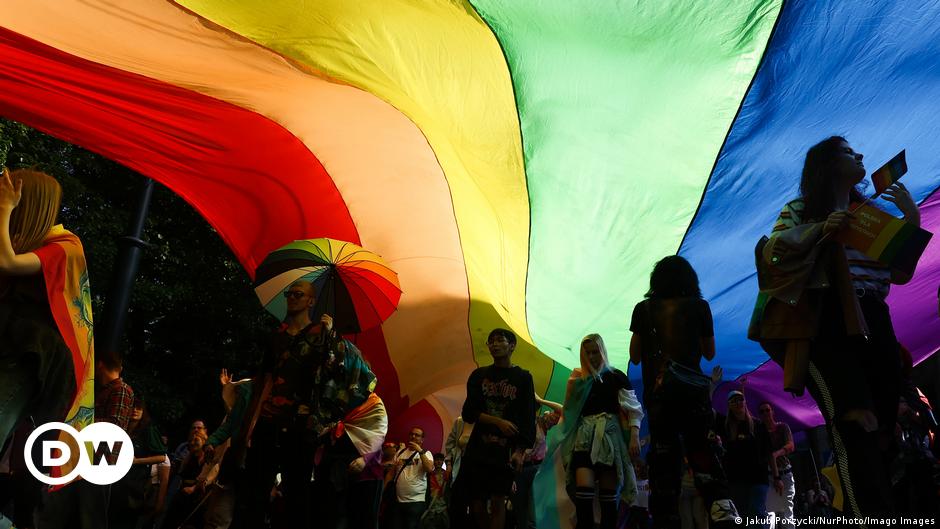LGBTQ+ activists share their stories with DW to warn against the potential consequences should nationalist and far-right parties make their expected gains in the European elections.
Monika Magashazi is a fighter. The 52-year old trans woman lives in Hungary — a country that has been ruled by Viktor Orban’s nationalist Fidesz party since 2010.
For transgender communities, the situation “has been becoming worse and worse and, unfortunately, we are desperate today in Hungary,” she told DW. She said the government was trying to portray trans people as pedophiles and criminals, using seemingly every opportunity to discriminate against them.
Struggling with her own coming out, Magashazi even attempted to take her own life. “I reached a point when I had to decide on how to live on,” she said. Thinking about her children saved her life.
“I said I will keep myself alive and try to live as a transgender woman and the father of my children — or the second attempt will be successful, and I’m going to be dead. And in that case, my children would miss their father,” she said.



No, because for others to understand it, it must follow some sort of logic.
If people all have different rules for what offends them, then those willing to learn, can never hope to ever achieve understanding. If you can never allow others to achieve understanding, then you’re always going to be a victim and acceptance will never be achieved.
If you can’t deadname a transgender woman their male name, then it goes to follow that they wouldn’t consider themselves a “father” and doing so would cause the same offense.
I don’t understand the feeling of being a different gender than what I was assigned at birth, and I don’t need to - I can accept that others may have those feelings just fine.
Why do you think others need to force themselves to fit your understanding? Why do you need to understand them to respect them?
Answer is - you don’t.
I don’t need to understand individuals to respect them, but I do feel the need to understand people as a whole.
“Transgender people are individuals that you can just talk to if you aren’t sure how they prefer to be referred to” shouldn’t be a scarier way to live than memorizing a rule book of The Correct Way to be transgender and interact with transgender people, as though we are a monolith.
Not all trans people prescribe to a binary view of gender in general or their own gender. Some people are women who are fathers or men who are mothers. They don’t have to justify themselves or the nuances of their identity to be accepted, because understanding isn’t necessary for acceptance. I accept shit I don’t understand all the time, like sportsball fans or Funko Pop collecting.
Acceptance isn’t “I am always interacted with in The Correct Way”, it’s “I am given a basic level of respect and listened to”.
Yeah, as others have said here. My point was you don’t need to understand why. You just need to understand that it’s what makes that person feel complete and not pigeon hole them with everybody else.
Who’s to say that the person that labels as a woman and a father is being offended? By assuming this person will be offended you’re labelling their personal feelings of who they are in to a stereotype.
My interpretation of your comment suggests it sounds like you’re worried about offending. I think the best position is to be okay with the idea that you’re going to offend some people sometimes. If you do, you apologize and explain that you didn’t realise that what you were saying may be interpreted that way, and move on. If they want to push it further than that, then they’re being difficult (just because somebody is in a minority, doesn’t mean they’re “right”). Everyone needs to realise that we’re not actually all out to get one another, and just let these little misunderstandings go.
Story time.
A good example of this, in a different setting, is that I was at a BBQ a few weeks ago. A guy I know, somewhere between acquaintance and friend, said I can drink his beers from his cooler because mine were in the fridge inaide. As I drank more, I totally took advantage of this (inhibitions lowered and all that) and drank a load of his beers. The week after when I saw him again I said “sorry man, I think I drank all your beers last week”. He said “no worries. All good”. And we moved on.
We do stuff that offends others all the time, and others do it to us. We just need to apologise when we realise and move on.
deleted by creator
I mean, just stop being offended over that kind of shit constantly and I won’t have to worry about it. Stop calling people intolerant when they use the wrong name. Stop attacking the people who are trying to learn, and maybe they will.
Normal, people don’t get offended if you forget their name. You need a set of rules that follows the stereotype. Then people can learn the stereotypical rules, and be fine.
Removed by mod